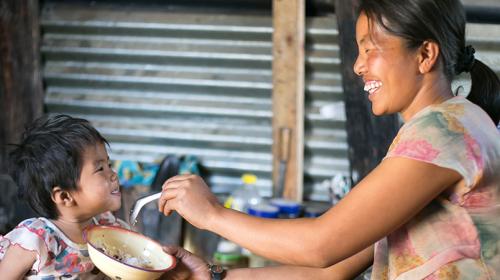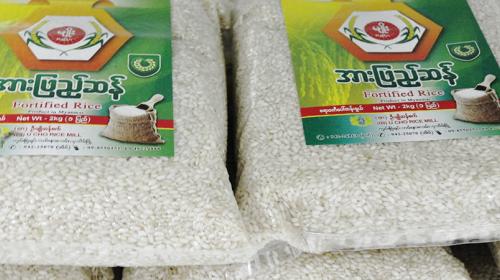
New publication charts future of LIFT’s work in nutrition-sensitive agriculture
LIFT has released a helpful technical brief, The Potential of Nutrition-Sensitive Agriculture in Post-2018 LIFT Programming, which clarifies definitions and approaches, and provides the basis for a common understanding on the topic across different actors and organisations. The purpose of the document is to offer a brief overview of global evidence and a review of selected LIFT-funded nutrition-sensitive agriculture projects to date, highlighting successes, challenges and limitations, and articulating the potential scope of what nutrition sensitive-agriculture could look like for LIFT, including recommendations for future programming. LIFT’s current and future implementing partners will find this document useful as a reference.
While a number of nutrition-specific interventions have proven to be effective and to yield high returns on investment, even if implemented at scale they cannot meet global targets for improving nutrition. In fact, a 2013 Lancet Journal article estimates that nutrition-specific interventions can only address 20 per cent of the nutrition problem. The remaining 80 per cent must be tackled through nutrition-sensitive interventions. As evidence emerges, the concept of nutrition-sensitive programming has gained traction globally. Investments in agriculture, which have great potential to improve (or undermine) nutrition outcomes, reach their fullest potential when deliberately designed and planned with the intention of having a positive impact on nutrition.
Since the inclusion of nutrition in the LIFT 2014 Strategy, implementing partners have been engaging in nutrition-sensitive agriculture projects in earnest. Nutrition-sensitive agriculture (NSA) aims to maximise the impact of nutrition outcomes for the poor, while minimising the unintended negative consequences of agricultural interventions and policies. There are three main pathways through which agriculture can impact nutrition, including food production, agricultural income, and women’s empowerment.
Key findings from global evidence on nutrition-sensitive agriculture
- NSA programmes have demonstrated a number of positive impacts on nutrition.
- Although NSA programmes have a range of positive impacts on nutrition, few programmes have demonstrated a direct impact on stunting during the period of project assessment.
- Enhanced Homestead Food Production is among the most impactful NSA interventions.
- While crop production diversity is generally a positive driver of dietary diversity, the greatest improvements are seen when households have increased access to markets
- The inclusion of a strong SBCC intervention to promote optimal diets and child feeding practices, and a focus on improving women’s status and empowerment through agriculture are consistently reported as key to enhancing the potential impacts of agriculture on diets and other nutrition outcomes.
- The role of livestock– both as a source of income as well as a rich source of key nutrients — is highly relevant to NSA approaches and reinforces a number of the lessons mentioned above.
Recommendations to LIFT
- Invest in LIFT IPs to support and capacitate MoALI staff at all levels to lead NSA efforts in the nutrition sphere.
- LIFT investments impacting on food access and availability should have a strong nutrition sensitive approach.
- Integrate standardised packages of evidence-based synergistic interventions or approaches in new LIFT programmes to achieve maximum nutrition impact.
- Support IPs to improve contextual analyses to ensure project relevance.
- Provide standardised design and measurement tools to IPs to strengthen NSA program design and learning.
- Support external evaluators to analyse relevant LIFT projects through a nutrition-sensitive lens.
- Strenthen the quality of research generated by IPs through the provision of practical guidance in study design and data collection for project-specific, LIFT-wide, and global learning.
- In addition to supporting the quality of data collection, facilitate the generation of evidence by supporting LIFT IPs to secure ethical clearance for research.
- Ensure that gender equality and women’s empowerment figure prominently in LIFT programmes and strategies, with accompanying implementation tools for IPs.
- Conduct review of past LIFT projects’ SBCC approaches and, based on findings, provide partners with practical resources and programme tools to improve SBCC design.





